Issue Archive
Table of Contents
EDITORIAL
Introduction to a How I Treat series on hematologic complications in pregnancy
Edited by Associate Editor Thomas Ortel, this How I Treat series on hematologic complications of pregnancy uses illustrative cases to discuss the management of thrombocytopenia, antiphospholipid syndrome, sickle cell disease, and myeloid proliferative neoplasms in the setting of pregnancy.
BLOOD COMMENTARIES
Toward a cure for cHL without chemotherapy
Clinical Trials & Observations
HOW I TREAT SERIES
How I treat thrombocytopenia in pregnancy
Edited by Associate Editor Thomas Ortel, this How I Treat series on hematologic complications of pregnancy uses illustrative cases to discuss the management of thrombocytopenia, antiphospholipid syndrome, sickle cell disease, and myeloid proliferative neoplasms in the setting of pregnancy.
How I diagnose and treat antiphospholipid syndrome in pregnancy
Edited by Associate Editor Thomas Ortel, this How I Treat series on hematologic complications of pregnancy uses illustrative cases to discuss the management of thrombocytopenia, antiphospholipid syndrome, sickle cell disease, and myeloid proliferative neoplasms in the setting of pregnancy.
How I treat sickle cell disease in pregnancy
Edited by Associate Editor Thomas Ortel, this How I Treat series on hematologic complications of pregnancy uses illustrative cases to discuss the management of thrombocytopenia, antiphospholipid syndrome, sickle cell disease, and myeloid proliferative neoplasms in the setting of pregnancy.
How I treat myeloproliferative neoplasms in pregnancy
Edited by Associate Editor Thomas Ortel, this How I Treat series on hematologic complications of pregnancy uses illustrative cases to discuss the management of thrombocytopenia, antiphospholipid syndrome, sickle cell disease, and myeloid proliferative neoplasms in the setting of pregnancy.
CLINICAL TRIALS AND OBSERVATIONS
Brentuximab vedotin with dacarbazine or nivolumab as frontline cHL therapy for older patients ineligible for chemotherapy
Clinical Trials & Observations
Older patients with advanced-stage classical Hodgkin lymphoma (cHL) have worse outcomes than younger patients and are also often excluded from clinical trials. Friedberg et al report on a noncomparative phase 2 study for patients with cHL over age 60 unfit for conventional chemotherapy who received either brentuximab vedotin (BV) plus dacarbazine (DTIC) or BV plus nivolumab. Responses were excellent, with the regimens yielding complete response rates of 64% to 67%. Median progression-free survival was 47.2 months with BV plus DTIC and not reached with BV plus nivolumab. Although this was a small study, these results suggest potential excellent alternatives for older unfit patients with cHL.
GENE THERAPY
Giroctocogene fitelparvovec gene therapy for severe hemophilia A: 104-week analysis of the phase 1/2 Alta study
Clinical Trials & Observations
Leavitt and colleagues report on the 2-year outcomes of gene therapy for hemophilia A with giroctocogene fitelparvovec, an adeno-associated virus vector carrying the coding sequence for the B-domain–deleted human factor VIII (FVIII) gene. At the highest dose, the mean circulating FVIII level at 1 year was 42.6%, with a range from 7.8% to 122.3%. Levels fell with time, with a mean level of 25.4% at 2 years. All of the patients at the highest dose level had meaningful clinical responses, with a low rate of bleeding events.
IMMUNOBIOLOGY AND IMMUNOTHERAPY
Trogocytosis drives red blood cell antigen loss in association with antibody-mediated immune suppression
Red blood cell alloimmunization during pregnancy can cause hemolytic disease of the fetus and newborn; if mediated by Rh incompatibility, this reaction can be prevented by the administration of polyclonal anti-D, which induces antibody-mediated immune suppression (AMIS). Cruz-Leal et al investigated the mechanism of AMIS, demonstrating that antibodies binding to erythrocyte antigens can induce trogocytosis, a process by which macrophages remove antibody-bound portions of membrane without phagocytosis of whole cells. These observations may facilitate development of AMIS directed against other red cell antigens.
LYMPHOID NEOPLASIA
Loss of CD20 expression as a mechanism of resistance to mosunetuzumab in relapsed/refractory B-cell lymphomas
Clinical Trials & Observations
Mosunetuzumab is a bispecific antibody targeting CD20 and CD3 with efficacy in B-cell non-Hodgkin lymphoma (NHL). Given recognition of CD20 antigen loss as a mechanism of resistance to CD19-targeting agents, Schuster and colleagues report on the contribution of CD20 expression to response to mosunetuzumab in patients with relapsed/refractory NHL in a phase 1/2 trial of the agent. CD20 expression was abundant in 95% of patients. At relapse, 34% of patients showed CD20 loss, which was mostly attributable to transcriptional downregulation or truncating mutations in CD20.
BLOOD WORK
-
Cover Image
Cover Image
![issue cover]()
Macrophage (F-actin, red) 6 minutes after the addition of immunoglobulin G–sensitized red blood cells (RBCs, green) with the extension of a pseudopod (left) which initiates trogocytosis (nibbling) of RBCs and antibody-mediated immune suppression. See the article by Cruz-Leal et al on page 807.
- PDF Icon Front MatterFront Matter
- PDF Icon Table of ContentsTable of Contents
- PDF Icon Back MatterBack Matter
- PDF Icon Editorial BoardEditorial Board
Advertisement intended for health care professionals
Email alerts
Advertisement intended for health care professionals


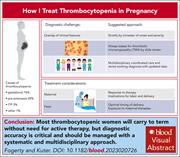
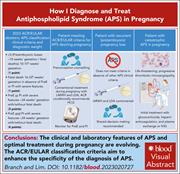
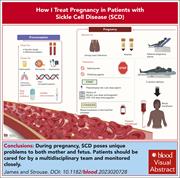
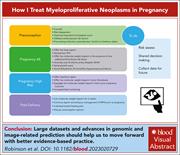
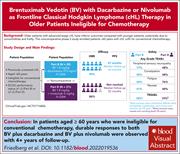
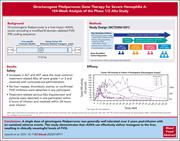
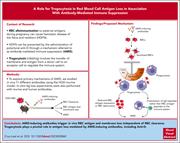
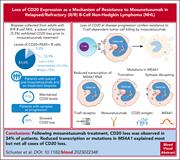

Toward a cure for cHL without chemotherapy
Clinical Trials & Observations